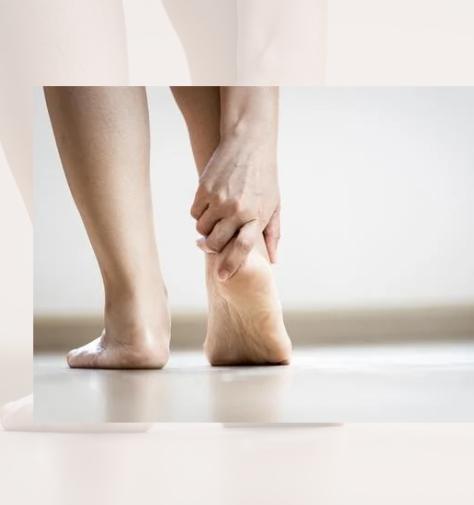Mid-portion Achilles Tendinopathy
Mid-portion Achilles tendinopathy refers to a specific type of Achilles tendon injury or condition that primarily affects the middle portion of the tendon, which is the region between the lower calf muscles and the heel bone.
It affects the tendon around 2 to 6cm above where it attaches onto the back of the heel bone.
Causes of Mid-portion Achilles Tendinopathy
Achilles tendinopathy can be caused by various factors and so understanding these causes is essential in managing and preventing the condition. Some common causes and contributing factors include:
- Overuse or Repetitive Stress. Activities that involve repetitive stress or overuse of the Achilles tendon without adequate rest or recovery time can lead to tendinopathy. This includes activities like running, jumping or sports that involve sudden stops and starts.
- Sudden Changes in Physical Activity. Rapidly increasing the intensity, duration or frequency of physical activity or exercise can strain the Achilles tendon, leading to injury and inflammation.
- Poor Biomechanics or Foot Mechanics. Structural abnormalities, such as flat feet, high arches or abnormal foot pronation can place excessive stress on the Achilles tendon, increasing the risk of injury.
- Inadequate Footwear. Wearing shoes that lack proper support, cushioning or do not fit well can contribute to Achilles tendon issues by increasing stress on the tendon during movement.
- Tight or Weak Muscles. Tightness in the calf muscles or weakness in the muscles surrounding the Achilles tendon can affect tendon function and also increase the risk of injury.
Symptoms
- Pain and stiffness
- Tenderness and swelling
- Increased pain with activity
- Limited range of motion
- Crepitus
- Morning stiffness
- Redness or warmth
Treatments for Mid-portion Achilles Tendinopathy
- Physical Therapy. Specific exercises and physical therapy modalities can help strengthen the calf muscles, improve flexibility as well as promote tendon healing. Eccentric strengthening exercises have shown effectiveness in Achilles tendinopathy rehabilitation.
- Orthotic Devices. Shoe inserts or orthotic devices prescribed by a healthcare professional can help provide support and relieve stress on the Achilles tendon during movement.
- Footwear Modification. Wearing proper footwear with adequate cushioning and support can also reduce strain on the Achilles tendon. Avoiding high heels as well as shoes that excessively bend the foot can be beneficial.
- Strapping or Taping. Using sports strapping or taping techniques may provide temporary relief by supporting the tendon and reducing stress on the affected area.
- Surgery. Surgery is usually considered as a last resort for severe cases that do not respond to conservative treatments. Procedures may involve removing damaged tissue or repairing the tendon.
Are you suffering from any foot condition? At The Chelsea Clinic, we can help. One of our podiatrist can assist and then recommend what treatments are best to get you back on track. Podiatrist South Kensington
Schedule an appointment here or you may call us at +44 (0) 207 101 4000.
We hope you have a feetastic day!
-The Chelsea Clinic and Team
Learn more about Fungal Nails




